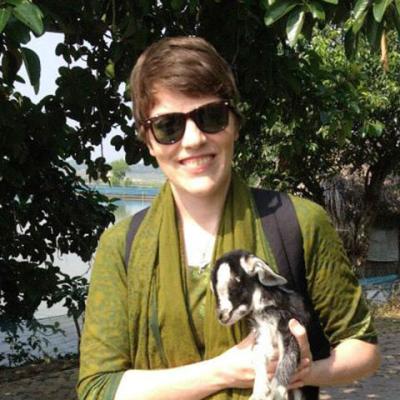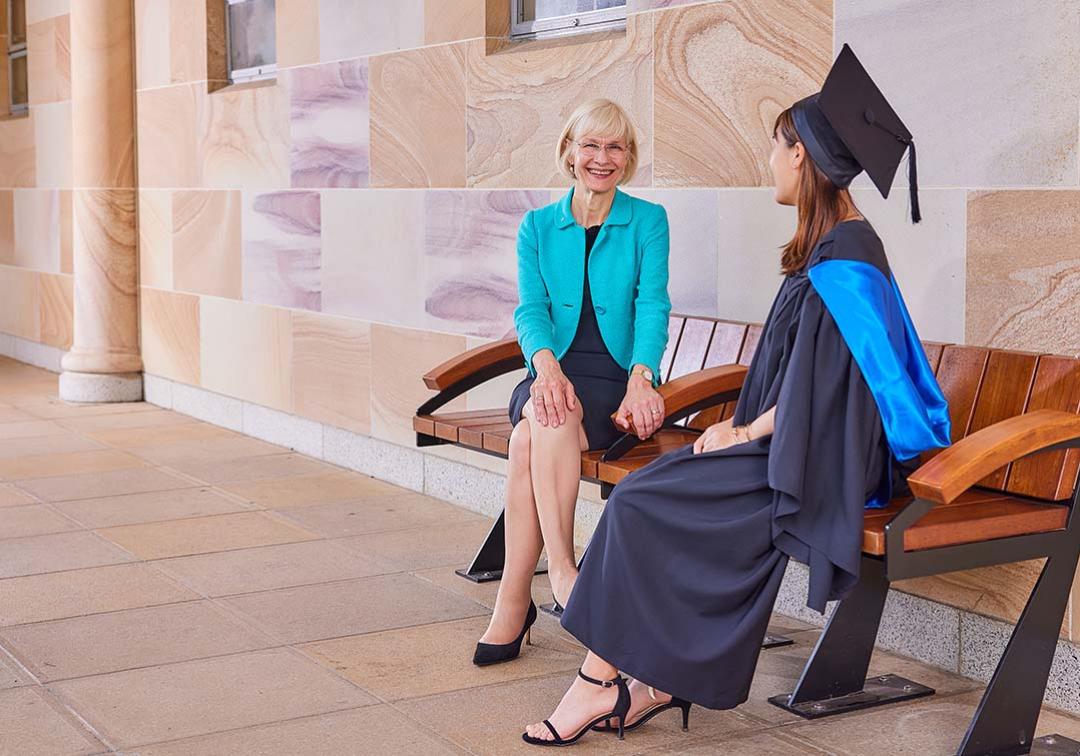
Bachelor of Social Science (Honours)
Overview
Take a deep dive into your specialty in social sciences and develop your research skills and knowledge, while gaining a valuable additional qualification which will differentiate you in the job market.
The Bachelor of Social Science with Honours is a single year of full-time (or part time equivalent) advanced level study where you'll apply your research skills in the humanities and social sciences.
Your Honours program will combine a flexible mix of coursework and independent study, during which you'll prepare and undertake an approved independent social science research project and submit a formal Honours thesis.
Under the Honours program, you'll be encouraged to extend your specialised study in either Health and Social Policy, Development or Environment and Society, and the program can be individually supervised across relevant UQ schools or research centres.
The program will allow you to develop, extend and consolidate your knowledge and skills in social science theory and research in relation to your specialisation area. It's a valuable additional qualification on entering the job market.
If you excel through the Honours program, you'll have the opportunity to progress onto a Master of Philosophy or further postgraduate study.
Program highlights
- Enjoy individual supervision from UQ's leading academics as you develop your Honours thesis.
- Hone your research skills and knowledge of your chosen field and gain a valuable additional qualification.
- Unlock pathways to further advanced study with a higher postgraduate degree.
Majors
Tailor your studies to suit your goals. This program offers these options:
- Development
- Environment and Society
- Health and Social Policy
How you'll learn
Your learning experiences are designed to best suit the learning outcomes of the courses you choose.
- Fieldwork
- Workshops
What you'll study
At UQ, degrees are called 'programs' and subjects are called 'courses'. Here's a sample of the courses you could study in this program:
- Social Science Honours thesis
- Social Science Honours Research Seminar 1
- Social Science Honours Research Seminar 2
Career possibilities
Our programs prepare you for your first job and beyond. Depending on which major you choose, here are some of the careers you could be on your way to:
- Aid project officer
- Public policy adviser
- Policy and research officer
- Social and government researcher
- Social and welfare services planner
- Community planning and policy adviser
- Community development manager
- Environment and sustainability consultant
- Academic researcher
Events
See all events
12 January - 12 January
Institute of Modern Languages High School Enrichment Program

9 June
Master of Physiotherapy information webinar
Stories
See all stories
UQ people
Turning her curiosity into a healthcare career
4-minute read

UQ people
Chiemeka’s PhD story: cost-effective treatment for brain disorders
4-minute read
Stories
See all stories
UQ people
Turning her curiosity into a healthcare career
4-minute read

UQ people
How a UQ scholarship helped Paul pursue his dream
5-minute read

UQ people
Chiemeka’s PhD story: cost-effective treatment for brain disorders
4-minute read
Entry requirements
Prerequisites
- Bachelor of Social Science from the University (or equivalent); and
- have gained a grade point average (GPA) of 5.0 on a 7-point scale from an approved combination of courses comprising:
- all Level 2 and Level 3 BSocSc Core Courses and 6 units of Level 2 and Level 3 courses from the chosen BSocSc Major; or
- satisfy the executive dean that the person is qualified to undertake the program based on the person's academic records and subject to completion of additional work, if set.
A person who completed their bachelor's more than two years prior to program commencement must obtain approval from the executive dean to enrol.
Other Entry Requirements
- The head of school may limit places depending on supervisor availability.
- Once eligibility is established, entry is via a competitive selection process based on GPA.
Prerequisites
- Bachelor of Social Science from the University (or equivalent); and
- have gained a grade point average (GPA) of 5.0 on a 7-point scale from an approved combination of courses comprising:
- all Level 2 and Level 3 BSocSc Core Courses and 6 units of Level 2 and Level 3 courses from the chosen BSocSc Major; or
- satisfy the executive dean that the person is qualified to undertake the program based on the person's academic records and subject to completion of additional work, if set.
A person who completed their bachelor's more than two years prior to program commencement must obtain approval from the executive dean to enrol.
Other Entry Requirements
- The head of school may limit places depending on supervisor availability.
- Once eligibility is established, entry is via a competitive selection process based on GPA.
English language requirements
IELTS overall 6.5; reading 6; writing 6; speaking 6; listening 6. For other English Language Proficiency Tests and Scores approved for UQ
TOEFL iBT (including Paper Edition) - Overall 87, listening 19, reading 19, writing 21 and speaking 19.
PTE Academic - Overall Score of 64 and 60 in all sub bands.
BE - A minimum overall grade of 4 plus a minimum grade of C in all macro skills.
CES - Overall 176 and 169 in all sub bands.
OET is not accepted.
There are other ways to meet the English language requirements. For some programs, additional conditions apply.
Student visas
International students who are accepted into full-time study in the Bachelor of Social Science (Honours) are eligible to apply for an Australian student visa (subclass 500).
There are a number of requirements you must satisfy before a visa is granted, including the Genuine Student (GS) requirement.
Fields of study
Fields of study
Tailor your studies to suit your goals. This program offers these options:
Fields of study
Tailor your studies to suit your goals. This program offers these options:
Fees and Scholarships
Indicative annual fee
Approximate yearly cost of tuition (16 units). Your fees will vary according to your selected courses and study load. Fees are reviewed each year and may increase.
$17,400
2026
Approximate yearly cost of tuition (16 units). Your fees will vary according to your study load. Fees are reviewed each year and may increase.
AUD $45,792
2026
Government assistance
Financial aid
As an international student, you might be eligible for financial aid – either from your home country, or from the Australian Government.
HECS-HELP
Domestic places in the Bachelor of Social Science (Honours) are Commonwealth supported, as long as you meet all Commonwealth supported place eligibility requirements.
This means the cost of your education is shared between you and the Australian Government. Instead of tuition fees, Commonwealth supported students pay what are called student contribution amounts.
If you have a Commonwealth supported place, you may also be eligible for HECS-HELP. This is an Australian Government loan scheme to assist eligible students with the cost of their student contribution amounts.
Centrelink support
The Australian Government offers a number of income-support payments to eligible Australian university students.
Scholarships
You may be eligible for more than 100 scholarships, including:
How to apply
Applying online
All international applications should be submitted to UQ. If you prefer, you can use an approved UQ agent near you.
The program code for the Bachelor of Social Science (Honours) is 2033.
Applying online
All domestic applications should be submitted to UQ.
The program code for the Bachelor of Social Science (Honours) is 2033.
Important dates
The closing date for this program is:
- To commence study in semester 1 - November 30 of the previous year.
Visa processing times vary. Apply and accept your offer as early as you can.
To learn more about UQ dates, including semester start dates, view the Academic Calendar.
Important dates
The closing date for this program is:
- To commence study in Semester 1 - January 31 of the year of commencement.
To learn more about UQ dates, including semester start dates, view the Academic Calendar.
Aboriginal and Torres Strait Islander applicants
For support with applying – or if you have any questions about university life – get in touch with our Aboriginal and Torres Strait Islander Studies (ATSIS) Unit.
Explore other programs
Express yourself. And your interest.
They say choosing a degree is hard, which is why we've made it easy. Register your interest and we'll send you everything you need to know about applying to UQ.





